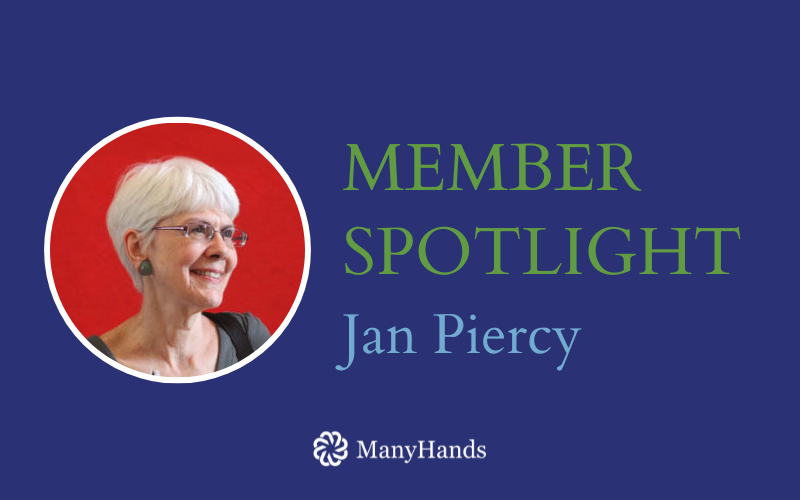Jan Piercy joined Many Hands in 2019 and has twice served on the Housing Committee. She moved from Chicago to Washington, DC with her family in 1992 to join the Clinton Administration, first at the White House and then for seven years as the US Director on the World Bank Group board. Jan also spent more than two decades with ShoreBank and later ShoreBank International, working to expand access to capital and credit for underserved communities in the US and abroad. She is now an advisor to Southern Bancorporation, an Arkansas-based community development financial institution serving the mid-South. Jan serves on the board of The Homeless Children’s Playtime Project, a local nonprofit serving families experiencing homelessness, and on selection panels for the Presidential Leadership Scholars Program, Echoing Green, and the Opportunity Collaboration Fellowship.
How did you become involved with Many Hands?
When I first came to Washington, I was focused internationally. When I had more time, I wanted to understand and get involved in the city where I live. I joined Playtime’s board, which exposed me to all the challenging issues DC faces. I first learned about Many Hands when a team doing due diligence visited the program we ran in the former DC General Hospital, which had become the largest homeless shelter in DC. The professionally diverse group was very impressive. They’d truly done their homework on Playtime, and they interacted with the children and families with tremendous sensitivity and respect. I realized that even if Playtime didn’t receive the award, we learned from Many Hands’ discerning questions and observations. Several years later, when Dianne Rudo urged me to join [Many Hands], I jumped at the chance.
Playtime didn’t win that first year I experienced the Many Hands selection process, but we were encouraged by the experience to apply again. Playtime’s work cuts across Many Hands’ focus areas, so we tried different committees over time. Ultimately Playtime was thrilled to receive the Impact Award in 2021.
What have you gained from your Many Hands experience?
So much! Not least, let me just say that Many Hands members are terrific individuals I love knowing.
I thought I knew a lot about organizations addressing community needs in DC. On the Housing Committee, though, I’ve met an array of exceptional organizations I did not know. I’ve been inspired and impressed by the wide range of dedicated, high-performing nonprofits serving our area. I now have a much better understanding of the entire local ecosystem supporting women, children, and families. This makes me a more discerning individual donor, a better board member, and a better citizen.
I love the fact that Many Hands focuses on organizations whose size or stage of development makes fundraising challenging and that we are laser-focused on children, women, and families. As Many Hands and the rigor of our selection process have become better known, other donors take interest in organizations Many Hands has recognized.
Applicants tell us that the Many Hands application process is itself a learning experience that can strengthen their fundraising capacities and can raise their visibility in the community whether or not they win a grant. Our affirming way of interacting with organizations also boosts morale.
Everyone on the committees brings such a professional level of focus and responsibility to their work. If you have time, I highly recommend serving on a Focus Area Committee. Doing so even for just a year educates you about local nonprofits. You’re then equipped to do a deep dive with your own philanthropy if you wish.
Even if your participation is limited to just voting at the annual meeting, membership is rewarding. Finalist presentations are enlightening and inspiring. At a time when a lot that’s happening locally and globally can be discouraging, Many Hands spotlights solutions and sources of hope.
And the larger Many Hands grows, the greater the leverage on each donation. I love the Many Hands multiplier effect. I really want Many Hands to get bigger!
Going back to your experience with Playtime, do you have any advice for members who may be interested in serving on a nonprofit board?
DC has some excellent organizations through which one can learn more about being on a board. Fair Chance, for example, offers orientation for board service along with various forms of support to nonprofits. Compass Pro Bono is another channel through which one can get to know nonprofits and gain experience valuable to serving on a board. Playtime has benefited from several Compass projects, and we’ve recruited outstanding directors from Compass teams.
A board’s role changes as an organization matures. In early founding stages, directors are “hands-on,” sometimes almost an extension of staff. Then as the organization evolves, a board appropriately steps back into more of a policy role, with clear delineation between staff and board functions. Some people thrive being on a board in the start-up stage; others feel more effective in established organizations. I suggest people ask themselves whether they want to be in on the beginning or at a later point, and where their own skills and experience can contribute most.
The financial commitment expected of board members is another consideration. Some nonprofit boards have explicit “give or get” expectations, while others are seeking particular skills or connections that can benefit the organization’s work, with less emphasis on personal contributions from board members.
My final suggestion in weighing board membership is to ask yourself whether you are passionate about the organization’s mission and program and to assess your abilities and interests in relation to talents already on the board: what will you distinctively be adding to this organization’s perspectives, experience, and contacts?
—Interview by Mary Kwak


